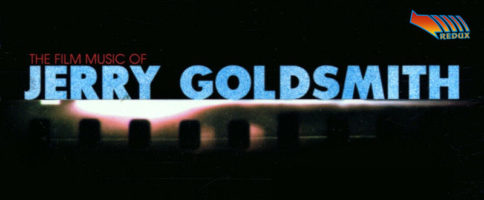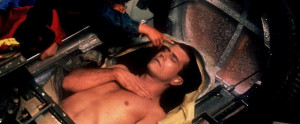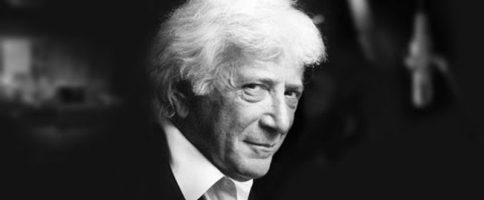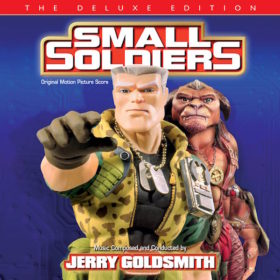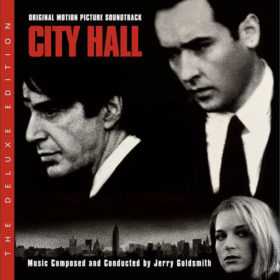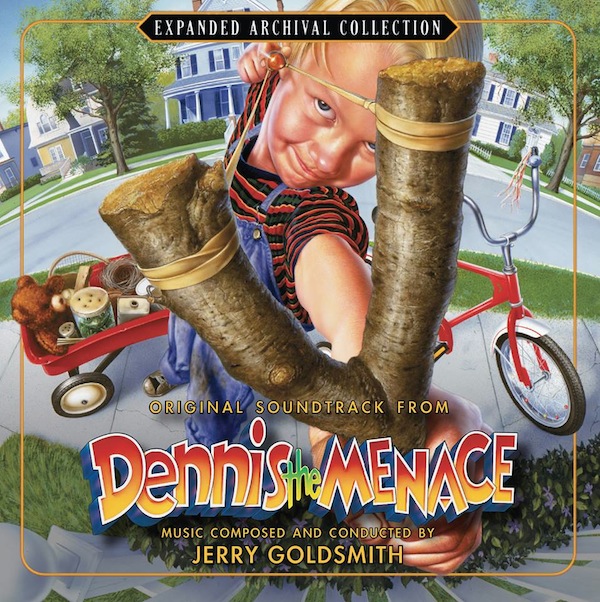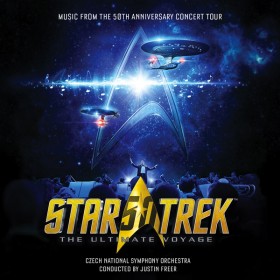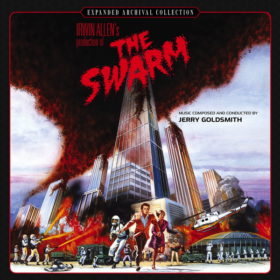You also have a great relationship with Paul Verhoeven. Could you describe your creative process with him ?
It’s very different. The interesting thing about Flesh+Blood is that when Paul was looking for music, he went to Luc Van de Ven, who has a record company, Prometheus Records, and he said «What do you think, what kind of music should I use ?» and Luc played him Conan. That’s the score that took me to Paul. I think he had shown the film to James Horner, and Horner said «I can’t do that, it’s a terrible movie». And I just was : «I got to do it ! This is the best movie I’ve ever seen in my life !», and frankly, it really was. 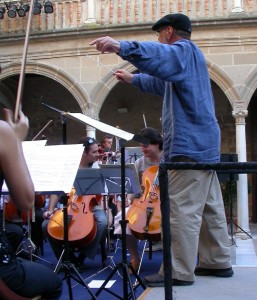 I loved it because I thought it was honest, and it was ruthless, and terrifyingly brutal, but what else would it be like ? The whole marriage of politics and religion was brilliant. The way Martin manipulates the band of people, almost like a gypsy band, but they’re really pirates in a way, they steal things, they got this carriage, almost like a land yacht, a land schooner, rowing across the country. We used to call it prairie schooners in the United States, the wagons that went west. That just reminded me of a pirate movie, it’s rollicking, it got a lot of life in it. And of course they’re mercenaries. People like to romanticize these things, but it’s probably the way it was. Horrible. When they bury the baby in the wine casket, there’s a tremendous humanity to that. And what, that didn’t happen ? People didn’t have hospitals, medicines and stuff like that. So I just said «I have to do this movie !».
I loved it because I thought it was honest, and it was ruthless, and terrifyingly brutal, but what else would it be like ? The whole marriage of politics and religion was brilliant. The way Martin manipulates the band of people, almost like a gypsy band, but they’re really pirates in a way, they steal things, they got this carriage, almost like a land yacht, a land schooner, rowing across the country. We used to call it prairie schooners in the United States, the wagons that went west. That just reminded me of a pirate movie, it’s rollicking, it got a lot of life in it. And of course they’re mercenaries. People like to romanticize these things, but it’s probably the way it was. Horrible. When they bury the baby in the wine casket, there’s a tremendous humanity to that. And what, that didn’t happen ? People didn’t have hospitals, medicines and stuff like that. So I just said «I have to do this movie !».
Flesh+Blood was a really tight budget. I remember he and Gijs Versluys, who was his producer at the time, came from Holland and they took the tube from the airport, because they couldn’t afford the taxi, and I felt guilty. Paul did the most wonderful thing, and most directors don’t use to do this : he spent probably his own money to make sure there was no temp track. He didn’t want me to be influenced by any preconception of what the music should be. I knew that he was more of an artist than most of the directors. He was also european, and I’ve always responded to the europeans directors more, to the exception of people I went with at USC, because I think we had a european background. Antonioni, Fellini, that’s the stuff we grew up on.
Flesh+Blood in a way was a set period. I wasn’t gonna do any electronics, I wasn’t gonna do rock’n roll, so the general style of the movie was really set, obviously medieval. Paul wanted to use a large orchestra, we used the London Symphony Orchestra for that. And he went back to Holland after I came up with the melody that would be my starting point (he sings the Main Title from Flesh+Blood). And then he would fax me pages and pages and pages of notes. «You know, at 22 seconds, there’s a look on Martin’s face, and at 45 seconds the mercenary puts his sword in the nun’s head…». And in the end, he would go «If this is bullshit, forget about it !». 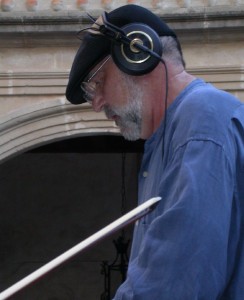 That’s the way it went. If you didn’t agree with what he was saying, he would allow you to trust your own instinct. But most of the time I agreed with him because what he was saying was good. At the time, and I didn’t realized it until we did RoboCop, I didn’t know that he had a PHD in higher mathematics. So, what Paul does is he can approach a scene with so many different aspects, points of view. He’s absolutely brilliant. He did it in The Fourth Man, but he also did it in Total Recall, when the psychiatrist comes in and tries to convince that Arnold Schwarzenegger’s crazy. That is such a brilliant scene ! It’s the same with Basic Instinct. That’s his genius.
That’s the way it went. If you didn’t agree with what he was saying, he would allow you to trust your own instinct. But most of the time I agreed with him because what he was saying was good. At the time, and I didn’t realized it until we did RoboCop, I didn’t know that he had a PHD in higher mathematics. So, what Paul does is he can approach a scene with so many different aspects, points of view. He’s absolutely brilliant. He did it in The Fourth Man, but he also did it in Total Recall, when the psychiatrist comes in and tries to convince that Arnold Schwarzenegger’s crazy. That is such a brilliant scene ! It’s the same with Basic Instinct. That’s his genius.
RoboCop was a little different because there was a lot of pressure. Paul already wanted a green card, and he knew RoboCop would be his entry to the United States. But he had a lot of trouble, and as a matter of fact he was appauled when they started making changes. The MPAA wanted to rate it, and they wanted to give it a triple X because of all the violence. It was very violent. But he did it on purpose because it was a comic book, and he thought that it made it funny, and it did. What they wanted to do is make it real. There is that scene at the beginning when Murphy gets shot, it’s a pretty hard scene, and they asked for many changes. He was devastated that somebody would tell the director what to do. So I had to call John Milius, because there is probably one person in the world who could talk to Paul Verhoeven and try to calm him down, and it’s John Milius. And maybe Francis Coppola. But Francis was God. We used to say that John talks to Francis and Francis talks to God. That’s the lineage. And then John called Paul, and he calmed him down, and he helped him to understand how the Hollywood machinery works. Altough he did had a very good relationship with Orion Pictures. It was Mike Medavoy at the time. Mike was a good film executive, there’s not too many of these guys left either. He was, he still is a good film executive, to this day.
We recorded RoboCop in London, and that was the first extensive use I did of electronics, mixing it with acoustics. At Abbey Road, in London, at EMI, I had a whole room full of synthetizers, and Derek Austin, brilliant british electronic musician, was the synth assistant and he had all the parts that had been presequenced. 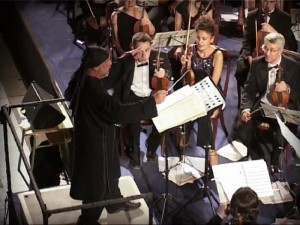 It was just when midi sequencers started coming in. It was the first time ever where you could actually play a hundred instruments with one computers. He was upstairs in studio C, with his own mixing desk and engineer. I had the London Philharmonic, or one of those London pick-up orchestras, it wasn’t the LSO, and there on the main floor, Howard Blake conducted. I was in the booth with Eric Tomlinson. The mixers would brought down all the electronic stuff, all the acoustic was here, and we did live mixing. And I swear, there’s a ghost in Abbey Road ! At one o’clock in the night, the temperature goes fifteen degrees, just like that. And guards say they hear footsteps ! So, Scott Smalley, who was my orchestrator, and I worked in there every night, and every night it would drop 15 degrees. And I turned to the ghost and said «Either get out of the way, or kill us, but don’t screw around with us !». And I swear, to this day, I can hear that track, and there’s a straaaaaange voice, I don’t know where it came from, but I didn’t write it. Well, if the ghost wanted to sing along, that’s okay, just get out of the way ! So we finally made peace with the ghost !
It was just when midi sequencers started coming in. It was the first time ever where you could actually play a hundred instruments with one computers. He was upstairs in studio C, with his own mixing desk and engineer. I had the London Philharmonic, or one of those London pick-up orchestras, it wasn’t the LSO, and there on the main floor, Howard Blake conducted. I was in the booth with Eric Tomlinson. The mixers would brought down all the electronic stuff, all the acoustic was here, and we did live mixing. And I swear, there’s a ghost in Abbey Road ! At one o’clock in the night, the temperature goes fifteen degrees, just like that. And guards say they hear footsteps ! So, Scott Smalley, who was my orchestrator, and I worked in there every night, and every night it would drop 15 degrees. And I turned to the ghost and said «Either get out of the way, or kill us, but don’t screw around with us !». And I swear, to this day, I can hear that track, and there’s a straaaaaange voice, I don’t know where it came from, but I didn’t write it. Well, if the ghost wanted to sing along, that’s okay, just get out of the way ! So we finally made peace with the ghost !
Paul is a wonderful director, I love working with him. Unfortunately, when Total Recall came on, I was already set to do The Hunt For Red October, and that’s when he went to Jerry Goldsmith. And it was a good choice. Better Jerry than James Horner. Jerry did a wonderful work for Paul. Basic Instinct was brilliant. Absolutely great score. But then Paul became more and more demanding. Not a micro manager, but it became difficult on Starship Troopers, and I know that the films Jerry did were too. None of us did Showgirls, thank god. What’s strange about that : Paul always thought it was going to be a modern version of All About Eve. That’s sad. I think it might have been lost in translation, the cultural aspect of it, it didn’t make it.
Starship Troopers was a 125 million dollars movie. In those days it was a lot of money to spend on a movie. I think it actually went to 150. There was a lot of pressure, and Paul was so wrapped up and began to work with Rob Bottin, from RoboCop, on the bugs, and all the technology for the CGI stuff, and then he became incredibly involved in everybody’s job. 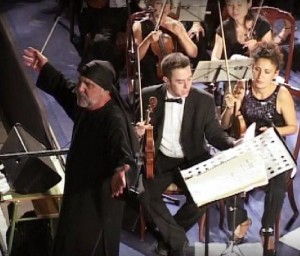 He started to be in position where he had sometimes more external pressures than there should have been. He insisted that I wait. He didn’t wanted me to work with animatronics, he wanted me to work with the final stuff, so I was on the movie for 9 months. It was very difficult, because he would show at 9 o’clock in the morning to hear stuff, and he approved or had me rewrite, and then he would come back at 9 o’clock at night. So we would work from 9 until 10 or 10:30 in the morning, and then he would come back at 9 and stayed until midnight. I never slept. I never really slept for 9 month, and it was a very difficult time. I loved working with him, I always do. But at this point we had the ability to do a mock-up, wich we didn’t have for RoboCop or Flesh+Blood. Then, there was just the piano, no synch relationship to the visual. But when we got to Starship Troopers, everything was sequenced, so we had a one-to-one relationship wich…I’m not sure about that, I don’t know if I like that, but all the movies are done that way by now. So the director can see what he’s gonna get, sort of. What you loose is the passion of the performance, the fire coming from a live performance. It’s not exactly sterile, but it’s unsettling. And of course, there was the political repercussions from that movie in the United States. You understood it in France. This is a very funny film, and a frightening film … «The only good bug is a dead bug». Unfortunately that was the last time we got to work together. RoboCop is one of the most difficult scores I ever written, and Starship Troopers was too. I mean, I don’t want to repeat myself, and I haven’t on either of those. I think each one of those scores are unique. They’re not like anything else I’ve ever done.
He started to be in position where he had sometimes more external pressures than there should have been. He insisted that I wait. He didn’t wanted me to work with animatronics, he wanted me to work with the final stuff, so I was on the movie for 9 months. It was very difficult, because he would show at 9 o’clock in the morning to hear stuff, and he approved or had me rewrite, and then he would come back at 9 o’clock at night. So we would work from 9 until 10 or 10:30 in the morning, and then he would come back at 9 and stayed until midnight. I never slept. I never really slept for 9 month, and it was a very difficult time. I loved working with him, I always do. But at this point we had the ability to do a mock-up, wich we didn’t have for RoboCop or Flesh+Blood. Then, there was just the piano, no synch relationship to the visual. But when we got to Starship Troopers, everything was sequenced, so we had a one-to-one relationship wich…I’m not sure about that, I don’t know if I like that, but all the movies are done that way by now. So the director can see what he’s gonna get, sort of. What you loose is the passion of the performance, the fire coming from a live performance. It’s not exactly sterile, but it’s unsettling. And of course, there was the political repercussions from that movie in the United States. You understood it in France. This is a very funny film, and a frightening film … «The only good bug is a dead bug». Unfortunately that was the last time we got to work together. RoboCop is one of the most difficult scores I ever written, and Starship Troopers was too. I mean, I don’t want to repeat myself, and I haven’t on either of those. I think each one of those scores are unique. They’re not like anything else I’ve ever done.






